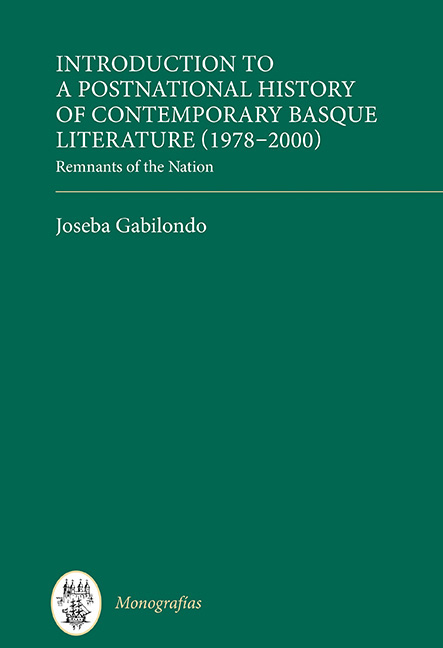 Introduction to a Postnational History of Contemporary Basque Literature (1978–2000)
Introduction to a Postnational History of Contemporary Basque Literature (1978–2000) Book contents
- Frontmatter
- Contents
- Preface and Notes on the Translation
- Acknowledgements
- I Postnational Theory and History
- II Writing the Nation: On Atxaga's Ethiopia and Obabakoak (1978-92)
- III After the Nation: Hybrid Postnational Literatures (1992-2000)
- 7 Before Babel: Globalization, Ethnic Hybridity, and Enjoyment
- 8 Terrorism as Memory: Historical Novels and Masochist Masculinity
- 9 Maternal Exile: Women Writers, Cultural Politics, and Individual Utopia
- 10 Melancholic Migrancy: Writing a Postnational Lesbian Self
- 11 Nationalist Crisis: Women's Literature and Neoliberalism
- Epilogue: Basque Literatures 2001-17
- Works Cited
- Index
9 - Maternal Exile: Women Writers, Cultural Politics, and Individual Utopia
from III - After the Nation: Hybrid Postnational Literatures (1992-2000)
Published online by Cambridge University Press: 06 September 2019
- Frontmatter
- Contents
- Preface and Notes on the Translation
- Acknowledgements
- I Postnational Theory and History
- II Writing the Nation: On Atxaga's Ethiopia and Obabakoak (1978-92)
- III After the Nation: Hybrid Postnational Literatures (1992-2000)
- 7 Before Babel: Globalization, Ethnic Hybridity, and Enjoyment
- 8 Terrorism as Memory: Historical Novels and Masochist Masculinity
- 9 Maternal Exile: Women Writers, Cultural Politics, and Individual Utopia
- 10 Melancholic Migrancy: Writing a Postnational Lesbian Self
- 11 Nationalist Crisis: Women's Literature and Neoliberalism
- Epilogue: Basque Literatures 2001-17
- Works Cited
- Index
Summary
Is desire ever anything else but desire for an idealized norm, the norm of the Other?
J. Kristeva, Powers of Horror (p. 47)There can be no sustainable existence without those idealizing […] representations through which we attempt to give feature and substance to our ultimately unspecifiable desire. This is so not only because life would be barren and the relational inconceivable without ideality, but because […] the articulation of desire is precisely what maintains the subject at a distance from das Ding [the Thing] and inscribes him or her as lacking.
K. Silverman, The Threshold of the Visible World (p. 69)The official number of writers affiliated to the Association of Basque Writers in 1998 totaled two hundred, which is another way of saying that they all knew each other. If one focuses on women writers, the number comes down to twenty–one, of which only thirteen were engaged in creative writing. In the Basque case, Virginia Woolf's famous dictum (‘a room of one's own and five hundred pounds a year’) could have taken an unexpected turn. Following the genealogy of interpretations triggered by Woolf's sentence, one could conclude that one room would still have sufficed to gather all Basque women writers and house their production: a room of their own. The five hundred pounds to which Woolf also referred has become a different matter altogether, as a result of women's professionalization – even though not precisely in the field of literature.
One could further narrow down the list of occupants of this hypothetical ‘room of their own’. At the risk of simplifying, one could name the ten women writers who were most active in the 1990s: Arantxa Urretabizkaia, Mariasun Landa, Laura Mintegi, Tere Irastorza, Arantxa Iturbe, Amaia Iturbide, Jasone Osoro, Yolanda Arrieta, Aurelia Arkotxa, and Itxaro Borda. The first eight are Spanish and the last two French. Although one must conclude that this is a very small group of writers, which could gather together and help each other quite effectively, the fact remains that there has not been an Association of Basque Women Writers to this day. Throughout the 1980s and 1990s, they did not publish together; neither did they identify themselves as such – although it would have been fairly easy to organize such a platform. In short, the proverbial Woolfian room did not materialize in the case of Basque women writers for many years.
- Type
- Chapter
- Information
- Introduction to a Postnational History of Contemporary Basque Literature (1978–2000)Remnants of the Nation, pp. 227 - 240Publisher: Boydell & BrewerPrint publication year: 2019


